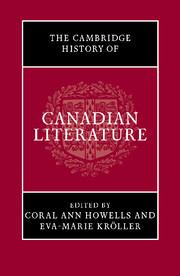Book contents
- Frontmatter
- Introduction
- PART ONE OLD AND NEW WORLD, LA NOUVELLE-FRANCE, THE CANADAS, DOMINION OF CANADA
- PART TWO THE POST-CONFEDERATION PERIOD
- PART THREE MODELS OF MODERNITY, POST-FIRST WORLD WAR
- 13 Staging personalities in modernism and realism
- 14 E. J. Pratt and the McGill poets
- 15 The 1940s and 1950s: signs of cultural change
- 16 The Centennial
- 17 Forms of non-fiction: Innis, McLuhan, Frye, and Grant
- PART FOUR AESTHETIC EXPERIMENTS, 1960 AND AFTER
- PART FIVE WRITING IN FRENCH
- Bibliography
- Index
- References
14 - E. J. Pratt and the McGill poets
from PART THREE - MODELS OF MODERNITY, POST-FIRST WORLD WAR
Published online by Cambridge University Press: 28 September 2010
- Frontmatter
- Introduction
- PART ONE OLD AND NEW WORLD, LA NOUVELLE-FRANCE, THE CANADAS, DOMINION OF CANADA
- PART TWO THE POST-CONFEDERATION PERIOD
- PART THREE MODELS OF MODERNITY, POST-FIRST WORLD WAR
- 13 Staging personalities in modernism and realism
- 14 E. J. Pratt and the McGill poets
- 15 The 1940s and 1950s: signs of cultural change
- 16 The Centennial
- 17 Forms of non-fiction: Innis, McLuhan, Frye, and Grant
- PART FOUR AESTHETIC EXPERIMENTS, 1960 AND AFTER
- PART FIVE WRITING IN FRENCH
- Bibliography
- Index
- References
Summary
Modernism took its time crossing the Atlantic, and when it arrived in downtown Toronto, it was as if it had eaten too much roast beef and drunk too much claret during its first-class passage. It was introduced to the Canadian nationalism of the 1920s. It was taken to see the Group of Seven. It fell asleep during a debate at the Arts and Letters Club about whether Bliss Carman was a better poet than Wilson MacDonald, and it didn’t wake up for twenty years.
This view of modernism’s arrival in Canada by a talented contemporary writer can be corroborated by a glance at the introductions of two major anthologies of Canadian poetry at the time of the First World War. In The Oxford Book of Canadian Verse (1913), after anxiously taking up most of his Preface considering at least five different sets of criteria to define Canadian poetry, Wilfred Campbell gives up and concedes that “the true British-Canadian verse, if it has any real root and lasting influence, must necessarily be but an offshoot of the great tree of British literature, as the American school also is, though less obviously.” Campbell then goes on to justify the inclusion of poems by the Duke of Argyll, Governor General of Canada from 1878 to 1883. In a similar vein, John W. Garvin, in his “Editor’s Foreword” to Canadian Poets (1916), gives a soaring characterization of poetry which, “at its height, implies beauty and the driving force of passion.”
- Type
- Chapter
- Information
- The Cambridge History of Canadian Literature , pp. 272 - 288Publisher: Cambridge University PressPrint publication year: 2009
References
- 1
- Cited by



